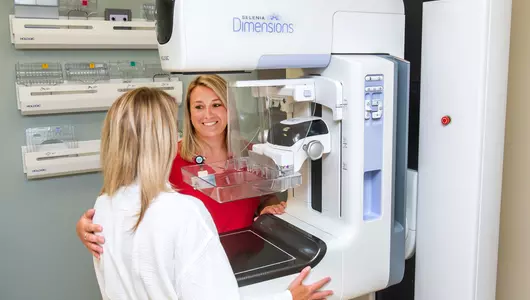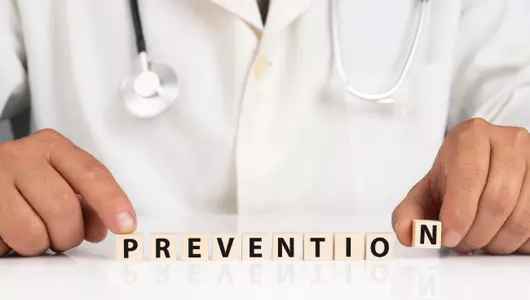
Mammograms & Breast Health
You want to keep yourself healthy, happy and thriving. At the Norma J. Vinger Center for Breast Care, that’s our goal, too. For the earliest detection of breast cancer, we offer screening mammograms close to home. We also care for women of all ages with cancer and non-cancerous breast conditions. And, if you're at high risk for developing breast cancer, you've come to the right place.
Conditions
- Breast dimpling
- Breast lumps
- Breast pain
- High risk for breast cancer
- Nipple discharge
- Non-cancerous breast conditions
- Questionable mammogram results
Services
- Mammograms
- Breast ultrasound and MRI
- Breast biopsy and lymph node biopsy
- Genetic testing and counseling
- High Risk Breast Cancer Clinic
- Second opinion services
- Surgical consultations
- Onsite 3D Mobile Mammography for Employers

Mammograms save lives
When breast tumors are small and most treatable, people rarely have symptoms. That’s why early detection through a mammogram is still the best way to fight the disease. Thousands of lives are saved through this simple preventive test. The next one could be yours.
Better screening with 3D mammography
Studies show 3D mammography reduces the number of patients called back for additional imaging tests. And, it finds cancer earlier than standard mammography alone. Call your preferred location or use MyChart (select locations) to schedule. 3D screening is covered by Medicare and a growing list of insurance providers.


Bringing mammography to you
Our Mobile Mammography Unit brings life-saving mammography to all women—wherever they might be. No one will be turned away because they aren't able to pay. Call your preferred Gundersen location or use MyChart (select locations) to schedule a mobile mammogram.
At high risk for breast cancer?
If you’re at an increased risk for developing breast cancer, turn to our High Risk Breast Care Clinic. We can help you develop a plan to reduce the chance that you'll ever have advanced breast cancer.

Breast health resources
Screening guidelines
If you're at average risk, start monthly self-exams at age 20 and yearly mammograms at age 40.
Signs of breast cancer
It’s important to be familiar with how your breasts look and feel so you can alert your healthcare provider if you notice lumps or other changes. Monthly self-exams combined with yearly mammograms can help detect breast cancer before signs and symptoms appear.
A breast cancer diagnosis
Chances are your mammogram will reveal no problems. If an abnormality is detected, our team of specialists will work with you and your local healthcare provider to provide immediate care.
Insurance and transportation
If you don't have insurance or your insurance does not cover a mammogram, there are programs to help you get a free mammogram. You may also qualify for rides to and from your appointment if you have Medicaid.
Need a second opinion?
When it comes to breast cancer, it’s not worth taking any chances. Get a second opinion for peace of mind. You don’t have to be a Gundersen patient. We’ll work with your provider to get access to your medical records and the results of tests you may have already had. Appointments can often be arranged in 1-3 business days.
We offer mammograms and breast health services close to home. You can visit us without a referral from your primary care provider.
Interested in our mammogram and breast health services? Let's get started.
Related articles

3D mammography now in-house at Gundersen Moundview

Gundersen coworkers form ‘mammo’ pact for annual breast cancer screening

MA-turned-financial counselor reassures cancer patients: ‘I, too, sat in your chair’

Cancer prevention: 6 ways to reduce cancer risk